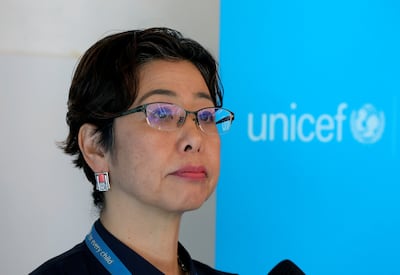More than half of families in Lebanon had at least one child who had to go without enough food amid a "dramatic deterioration of living conditions", the UN's children's fund said on Tuesday.
Children have been hit hard by the country's deep economic crisis exacerbated by the global coronavirus pandemic that has left about eight in 10 people poor and threatens the education of some 700,000 pupils, including 260,000 Lebanese, Unicef said in a report.
"I had never seen a malnourished child in this country before, but recently I witnessed a child who is really suffering from malnutrition," said Yukie Mokuo, the UN agency's representative in Lebanon, during a press conference in Beirut.
The report, Surviving Without the Basics, highlighted a dramatic deterioration in living conditions of households interviewed in April and then again in October. They include Lebanese families as well as Syrian and Palestinian refugees.
"Lebanon is very sadly in freefall and it's quickly hitting rock bottom," said Ms Mokuo.
The report found that more than half of the families (53.4 per cent) surveyed in October said at least one child missed a meal in the previous 30 days because the family did not have enough food, a dramatic increase from 36.7 per cent in April.
The proportion of surveyed families who sent their children to work rose from nine per cent to 12 per cent between April and October and reached seven per cent in the case of Lebanese households.
The interviews were conducted by telephone with 1,244 households in April, of which 838 took part six months later.
Unicef representative in Lebanon
"The needs are massive and the cost of inaction is too high. Unless we act now, every child's future in Lebanon is at stake," said Ms Mokuo.
"If children don't grow up as they need to, the country will be in a serious crisis in five or ten years' time. We cannot waste even a minute."
Amal, 15, who works as a fruit-picker in southern Lebanon, told Unicef staff she had to take up the job to support her family.
"Our parents need the money we earn. What would they do if we stopped working now?" she said. "When I look to the future, I see life getting harder."
The multifaceted crisis, rooted in decades of corruption and mismanagement, has led to a breakdown in the provision of basic services such as electricity and water.
Nearly half of households had insufficient drinking water by October 2021, the report said, with a third of them citing cost as the main factor.
"The staggering magnitude of the crisis must be a wake-up call," said Ms Mokuo.
The report noted that less than three in 10 families had received social assistance, leading them to take "desperate measures".

Prime Minister Najib Mikati's government has been slow to carry out social safety programmes including a $246 million World Bank-funded project adopted by parliament in March and a $556 million ration card scheme backed by the legislature in June.
Ms Mokuo said that Unicef was calling for "action from everybody", from the government, to civil society and families.
"We are calling on the government to have a strong policy and strategy so that all social protection measures can be in place," she said.
Families "in distress" can take small steps including regarding complementary feeding for infants, she added.
"A lot of women are looking for infant formula that families cannot afford. But we know at the same time that women in Lebanon do not breastfeed or do not know the best way of complementary feeding for children," said Ms Mokuo. "Look for the best information on how to feed your child. That's just an example."

